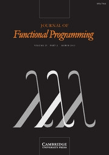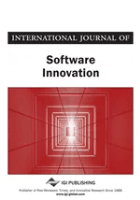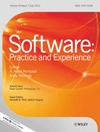
Journal of Computer Languages
Scope & Guideline
Exploring Innovations in Software Development
Introduction
Aims and Scopes
- Programming Language Design and Implementation:
Focuses on the creation and optimization of programming languages, including new language features, compilers, interpreters, and domain-specific languages. - Software Engineering Practices and Methodologies:
Explores effective software development practices, methodologies, and tools that enhance productivity and code quality in various programming environments. - Model-Driven Engineering (MDE):
Investigates model-driven approaches for software development, emphasizing visual modeling, transformations, and the integration of models in the development lifecycle. - Empirical Studies in Software Development:
Conducts empirical research to understand developer behaviors, challenges, and the impact of tools and languages on software engineering practices. - Application of AI and Machine Learning in Programming:
Examines the intersection of artificial intelligence and programming, including the use of machine learning for code analysis, optimization, and automated tooling. - Human-Computer Interaction in Programming:
Studies the usability and accessibility of programming languages and tools, focusing on user experience and end-user development.
Trending and Emerging
- AI-Driven Software Development:
The incorporation of AI tools in software development, including code generation, debugging, and optimization, is gaining significant attention, reflecting a broader trend towards automation in programming. - IoT and Embedded Systems Programming:
Research focusing on programming languages and tools for IoT systems has surged, highlighting the need for specialized languages and frameworks to handle the complexity and constraints of embedded environments. - Declarative and Reflective Programming:
An increasing interest in declarative programming approaches and reflection in programming languages shows a shift towards more abstract and flexible programming paradigms. - Visual and Model-Based Programming:
The trend towards visual programming languages and model-based development frameworks is growing, emphasizing accessibility and ease of use for non-expert programmers. - Human-Centric Programming Tools:
There is a rising focus on tools and methodologies that enhance the developer experience and usability, including studies on how developers interact with programming languages and platforms.
Declining or Waning
- Traditional Programming Paradigms:
There is a noticeable decline in research focused on traditional programming paradigms, such as procedural programming, as newer paradigms gain traction. - Low-Level Language Optimization Techniques:
Research on low-level optimization techniques for languages like C and assembly has decreased, possibly due to the rise of higher-level abstractions and automated optimization tools. - Static Analysis of Legacy Code:
While still relevant, static analysis focused specifically on legacy codebases has seen less attention, as newer methodologies and tools emerge for modern development practices. - Formal Methods in Software Verification:
Interest in formal methods for software verification appears to be waning, likely overshadowed by practical applications of machine learning and AI in software testing. - Monolithic Software Architectures:
Research on monolithic software architectures is becoming less common, as the industry increasingly shifts towards microservices and distributed systems.
Similar Journals

Proceedings of the ACM on Programming Languages-PACMPL
Transforming the Landscape of Programming Language Research.Proceedings of the ACM on Programming Languages (PACMPL) is a premier journal that focuses on the advancement and dissemination of knowledge in the field of programming languages. Published by the Association for Computing Machinery (ACM), this rigorous journal serves as a vital platform for researchers, professionals, and students alike, contributing significantly to software development and safety across diverse applications. With impressive rankings in Q1 quartiles for both Safety, Risk, Reliability and Quality and Software, and a recognition in the Scopus Rankings, PACMPL stands out as a critical resource for cutting-edge research. The journal is particularly relevant in today’s rapidly evolving technological landscape, focusing on innovative practices and methodologies in programming languages that enhance system reliability and performance. As an Open Access publication since its convergence in 2017, PACMPL not only emphasizes high-quality peer-reviewed research but also prioritizes accessibility, making significant contributions to the global knowledge base. By empowering researchers and practitioners with the latest findings and trends, PACMPL continues to firmly establish its importance in the computing field.

JOURNAL OF FUNCTIONAL PROGRAMMING
Catalyzing Insights for the Future of Functional ProgrammingJOURNAL OF FUNCTIONAL PROGRAMMING, published by Cambridge University Press, is a leading academic journal dedicated to advancing the field of functional programming. With an ISSN of 0956-7968 and an E-ISSN of 1469-7653, this UK-based journal has been disseminating high-quality research since its inception in 1991, and continues to thrive with a convergence set for 2024. Although the journal is categorized in the Q3 quartile in the Software category as of 2023 and holds a Scopus rank of #335 out of 407 (17th percentile), it remains a critical platform for innovative theoretical and experimental work in functional programming, attracting contributions from thought leaders and emerging scholars alike. The journal's objectives are to foster scholarly dialogue, provide insights into the latest methodologies, and explore the practical applications of functional programming concepts. While it does not currently offer open access, researchers and educators will find valuable resources that enhance understanding and inspire future developments within the discipline. Whether you are a seasoned professional, a researcher, or a student, the JOURNAL OF FUNCTIONAL PROGRAMMING promises to be an essential resource for your academic pursuits.

EMPIRICAL SOFTWARE ENGINEERING
Unveiling the truths of software systems through empirical studies.Empirical Software Engineering is a leading journal published by Springer, dedicated to advancing the science and practice of software engineering through empirical research. With an impressive impact factor in the Q1 quartile of the Software category and a Scopus ranking of #76 out of 407 journals, it occupies a prominent position within the field, attracting high-quality submissions from around the globe. Since its inception in 1996, the journal has provided a vital platform for disseminating critical findings that drive the evolution of software development methodologies and practices. While it is not an open-access journal, its rigorous peer-review process ensures that only the most impactful research reaches its readership, making it an essential resource for researchers, professionals, and students looking to stay at the forefront of software engineering innovations. Based in the Netherlands at Van Godewijckstraat 30, 3311 GZ Dordrecht, Empirical Software Engineering continues to set the standard for quality and significance in empirical studies of software systems and processes.

Software and Systems Modeling
Pioneering Insights in Software and SystemsSoftware and Systems Modeling is a premier journal published by Springer Heidelberg, dedicated to advancing the fields of software engineering, modeling, and systematic design. With an ISSN of 1619-1366 and an E-ISSN of 1619-1374, this journal has established itself as a critical resource for researchers and practitioners alike since its inception in 2005. The journal currently holds a Q1 quartile ranking in the Modeling and Simulation category and a Q2 ranking in Software, reflecting its influential contributions to the field. Its Scopus rankings further underscore its relevance, positioned at #55 in Modeling and Simulation and #139 in Software, with impressive percentiles of 83rd and 65th respectively. Although it does not currently offer open access, it remains an essential platform for disseminating innovative research and fostering dialogue among professionals in Germany and beyond. The journal’s objective is to publish high-quality articles that contribute to the understanding and development of software and systems modeling, ensuring ongoing advancements in this dynamic arena.

Frontiers of Computer Science
Advancing the Boundaries of Computational InnovationFrontiers of Computer Science is a leading peer-reviewed journal dedicated to advancing the field of computer science through the publication of high-quality research articles, reviews, and theoretical discussions. Published by HIGHER EDUCATION PRESS, this journal has gained significant recognition, currently boasting a prestigious impact factor and ranking in the Q1 quartile for both Computer Science (miscellaneous) and Theoretical Computer Science categories in 2023. With a focus on the intersection of computational theory and practical applications, it serves as a vital platform for researchers, professionals, and students alike who are eager to contribute to and stay updated with groundbreaking developments. The journal’s scope encompasses a wide range of topics, reflecting the diverse nature of computer science today. Operating from Beijing, China, it emphasizes Open Access, ensuring that vital research is readily available to the global academic community. With its convergence period spanning from 2013 to 2024, Frontiers of Computer Science remains committed to fostering innovation and scholarly dialogue that drives the future of technology.

Applied Computer Systems
Unlocking Potential Through Rigorous ResearchApplied Computer Systems is a distinguished journal published by SCIENDO, specializing in the dynamic field of computer science and technology. With the ISSN 2255-8683 and E-ISSN 2255-8691, this Open Access journal has been committed to disseminating high-quality research since 2008, ensuring global accessibility for researchers and practitioners alike. Hailing from Warsaw, Poland, the journal serves as a crucial platform for innovative studies that delve into applied computing methodologies and their diverse applications across industries. By maintaining rigorous peer-review standards, Applied Computer Systems supports the advancement of knowledge in computing, making it an essential resource for students, professionals, and academics seeking to stay at the forefront of technological progress. Engage with a community dedicated to exploring the integration of computer systems in a rapidly evolving digital landscape.

International Journal of Software Innovation
Exploring the Frontiers of Software Technology.The International Journal of Software Innovation, published by IGI Global, serves as a crucial platform for disseminating cutting-edge research in the field of software engineering and innovation. With its ISSN 2166-7160 and E-ISSN 2166-7179, this journal has a broad scope that encompasses multiple areas of computer science, including Artificial Intelligence, Computer Graphics and Computer-Aided Design, Computer Networks and Communications, Software, and Computer Science Applications. Since its inception in 2017 and continuing until 2024, the journal has established itself in Q4 quartiles across various categories, reflecting both emerging trends and foundational principles in software innovation. Although it does not currently follow an Open Access model, its findings are vital for researchers, professionals, and students aiming to understand and contribute to the evolving landscape of software technologies. Located in the United States at 701 E Chocolate Ave, Ste 200, Hershey, PA 17033-1240, this journal not only offers research insight but also encourages collaboration and knowledge sharing among scholars worldwide.

Journal of Computer Science & Technology
Connecting global scholars through innovative research.The Journal of Computer Science & Technology, published by UNIV NAC LA PLATA, FAC INFORMATICA, serves as a vital platform for disseminating high-quality research in the expansive fields of computer science, including but not limited to Artificial Intelligence, Computer Science Applications, Computer Vision, and Software Development. Since its inception in 1999, this Open Access journal has prioritized accessibility, ensuring that groundbreaking research from Argentina and beyond reaches a global audience of scholars, practitioners, and students alike. With a broad spectrum of articles indexed in Scopus, the journal operates within the Q3 quartile across various categories, reflecting its commitment to evolving scholarship in the technology domain. Researchers interested in advancing their knowledge and contributing to the field will find the journal an essential resource for contemporary discussions and developments in computer science.

SOFTWARE-PRACTICE & EXPERIENCE
Empowering researchers and professionals with quality software insights.SOFTWARE-PRACTICE & EXPERIENCE, published by Wiley, is a prestigious journal that has significantly contributed to the field of software engineering since its inception in 1971. With a Q2 ranking in Software according to the 2023 category quartiles, it stands among the top tier of journals, positioned in the 79th percentile within Scopus’s Computer Science _ Software category. The journal focuses on disseminating high-quality research that reflects both academic rigour and practical application in software-related practices, ensuring that it remains relevant for researchers, professionals, and students alike. Although it does not currently offer Open Access options, it continues to provide invaluable insights and thorough explorations of contemporary issues in software development, methodology, and experience. As it converges toward 2024, SOFTWARE-PRACTICE & EXPERIENCE aims to foster a greater understanding of effective software practices in a rapidly evolving technological landscape.

Bulletin of the South Ural State University Series-Mathematical Modelling Programming & Computer Software
Empowering Research through Open Access KnowledgeThe Bulletin of the South Ural State University Series-Mathematical Modelling Programming & Computer Software is a distinguished academic journal focusing on the interdisciplinary fields of mathematical modeling, programming, and software development. Published by the SOUTH URAL STATE UNIVERSITY, SCIENTIFIC RESEARCH DEPARTMENT, this journal serves as a platform for the dissemination of innovative research findings, methodologies, and applications in computational mathematics and related disciplines. With its ISSN 2071-0216 and E-ISSN 2308-0256, it has garnered attention within the research community, reflected in its rankings within the Q4 quartile across multiple categories in 2023, including Computational Mathematics and Software. Although it operates under an open access model, the journal emphasizes the importance of high-quality, peer-reviewed content to advance research education and practice in the Russian Federation and beyond. Researchers, professionals, and students are encouraged to contribute and access valuable insights, fostering collaboration among disciplines spanning mathematical theory, computational methods, and software development.